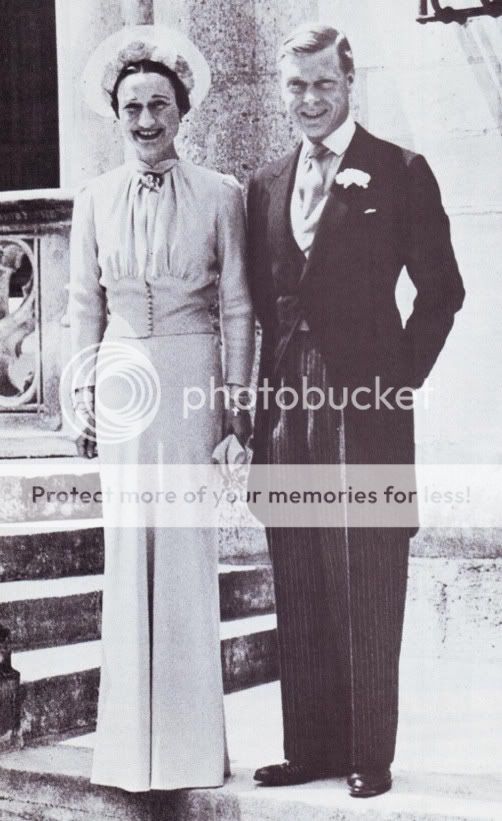 |
| Nice photo-op |
The marriage which was not expected to last - Simpson was not Edward's first great love affair, and the others had petered out - did so until Edward's death in 1976. Given our next king will be a divorcee married to another divorcee, we can see that time has changed (although whether she will be Queen is still a matter of speculation.) It was Noel Coward who suggested that there should be a statue of Wallis Simpson in every town in Britain, as a tribute to the woman who stopped Edward becoming king. It was a typically waspish Coward thing to say, but contains more than a kernel of truth. A lot of the anger directed towards Simpson derived from her nationality and her marriage status, not to mention her commoner status. But she did seem to bring out the worst in Edward, through her love of money, jewellery, and attention. Not to mention her friends in Germany. But Ziegler dismissed the more lurid rumours about her life and sexuality, simply from lack of evidence.
The other use that Edward gets put to in literature is as King of England in the alternative universe where Germany won WWII. Edward, like many of his time, was an appeaser of the Germans and an admirer of the order that the Nazis brought to what had been a country in some chaos. He visited Germany in the late 30s, met the top Nazis, and has been accused of being pro-Nazi.
 |
| Ill-advised photo-op |
Edward's post-adbication life was about half of his life and yet it takes up perhaps a third of this book, even less, which gives you a fair indication of its action-packed nature. He does well as Governor of the Bahamas during the Second World War, working hard to improve the local economy and the position of the majority black population. But apart from that, most of his energy seemed to be spent on making the Royal Family keep him the style he had become accustomed and trying to get his wife made a Royal Highness. As neither of them were in the line of succession, it seems a fruitless argument. He never seemed to put his energy or his name to anything of use to anyone but himself and his wife.
 |
| Possibly from the Abdication Crisis |
In the end, I kept thinking of what was the point of Edward VIII? If you are born to the royal family, supported by the resources of the people of Britain, and then opt out of what you were born to do, what is the point of you? Perhaps once he had stopped being king, he should have gone out, got a job, and got on with things as Mr Windsor (or Saxe-Coburg or whatever. Actually, just change his name to Sax Coburg and become a jazz man. Ok, that's a bit silly.) Such a path would be unthinkable then, and perhaps now. But we fetishise self-fulfilment these days to the detriment of everything else - responsibility to others, for example. Responsibility to your society. Edward may have been the harbinger to the modern liberal fallacy that your happiness is the only thing that matters and damn everybody and anything else. Duty, sacrifice, selflessness are all qualities we disparage so we can all be the best you you can be, and I don't see society improving as a result. I don't suggest one should ignore personal fulfilment but I'm not convinced it should be the driver of society that it is. In The Madness of George III, the king's last line (in the film at least) is that the Royal Family is there to be an example. Maybe we all looked to the wrong King.